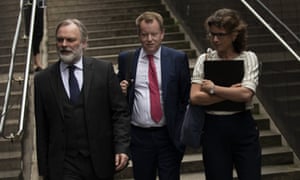PM’s negotiators intent on waiting until last minute before sharing plan with Brussels

The UK’s Brexit adviser, David Frost (centre), and the British ambassador to the EU, Tim Barrow (left), at EU headquarters in Brussels last week.Boris Johnson’s Brexit negotiators have so far only presented the EU with a draft of the withdrawal agreement with the backstop scrubbed out, UK government sources have confirmed.
In a move that has caused tensions with EU leaders, Johnson’s team are refusing to put forward a written proposal to Brussels at this stage for fear it will be rejected out of hand or publicly rubbished.
Instead, they want to wait until almost the last minute before the October summit before presenting a plan to the EU, with just two weeks before the UK is due to leave the bloc.
The UK government source said the two sides had debated alternatives to the backstop in written discussion documents – such as an all-Ireland regulatory zone and customs checks away from the border – but they would not be putting forward a legal text to the EU at this stage.
There have been reports that David Frost, the UK’s lead negotiator, is keeping a plan locked safe in his briefcase but the wording has not been shared with Brussels.
Frustration with the UK’s approach broke into the open on Monday as Xavier Bettel, the prime minister of Luxembourg, gave a press conference next to an empty podium following a meeting with Johnson, who refused to take part because of loud protests nearby. Bettel said the UK government needed to put on paper an alternative to the Irish backstop, and appeared to suggest that party political considerations might be standing in the way.
“I told him: ‘I hear a lot but I don’t read a lot.’ If they want to discuss anything we need to have it written [down] … Don’t put the blame on us because they don’t know how to get out of the situation they put themselves in,” Bettel said.
As the chaotic scenes were played out, the European commission issued a statement disclosing that its president, Jean-Claude Juncker, had told the prime minister it was his responsibility to come forward with legally operational solutions and that “such proposals have not yet been made”.
Johnson has brushed off the Luxembourg incident with a claim that he is still working towards a deal and believes EU leaders will want to strike an agreement because they have had a “bellyful” of Brexit.
He spoke to Angela Merkel, the German chancellor, on Tuesday morning, agreeing to have further discussions with her in New York at the UN general assembly next week. There are only three days left until the end of the 30-day deadline Merkel gave Johnson last month to come up with alternative solutions to remove the need for a backstop, which Eurosceptics in parliament refuse to vote for because it could keep the UK indefinitely in a customs union.
Johnson is also likely to meet Donald Tusk, the European council president, at the UN conference and No 10 hopes that some progress towards a deal could be made at that summit.
However, many in Brussels are sceptical there is enough time left to do a deal. It is just one month before the crucial EU summit on 17 October, where Johnson hopes to secure a deal, and six weeks before the UK is due to leave on 31 October unless it requests an extension.
Johnson is mandated by the UK parliament to seek a three-month extension if he does not strike a Brexit deal by then. He has insisted he will not do this but has not set out how he would avoid such an outcome.
Robert Buckland, the justice secretary, refused on Tuesday to rule out a second prorogation as part of No 10’s tactics to achieve a no-deal Brexit.
Asked on BBC Radio 4’s Today programme whether the current suspension of parliament could happen again, Buckland said: “Harold Wilson said a week is a long time in politics. It seems like an hour is a long time in politics at the moment.
“For me to sit here and imagine what might happen at the end of October, I think, is idle. What I do know, if we are able to, we will have a Queen’s speech in mid-October, there will be debate during that time and a vote as well, and perhaps a series of votes.
“Parliament has already shown its power. It had a week in September where it made pretty significant legislation. I think the idea that somehow parliament has been prevented from having its voice doesn’t seem to be borne out by events, frankly.”
Since you’re here…
… we have a small favour to ask. More people are reading and supporting The Guardian’s independent, investigative journalism than ever before. And unlike many new organisations, we have chosen an approach that allows us to keep our journalism accessible to all, regardless of where they live or what they can afford. But we need your ongoing support to keep working as we do.
The Guardian will engage with the most critical issues of our time – from the escalating climate catastrophe to widespread inequality to the influence of big tech on our lives. At a time when factual information is a necessity, we believe that each of us, around the world, deserves access to accurate reporting with integrity at its heart.
Our editorial independence means we set our own agenda and voice our own opinions. Guardian journalism is free from commercial and political bias and not influenced by billionaire owners or shareholders. This means we can give a voice to those less heard, explore where others turn away, and rigorously challenge those in power.


